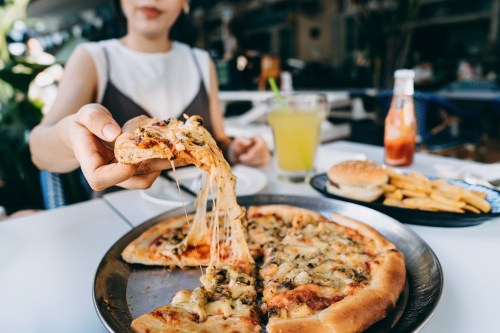Pop quiz! Your workday is winding down and you’re counting the minutes to your p.m. workout. To bolster your flagging energy for the burpees and squat jumps to come, do you:
A) Grab a jerky bar from your desk drawer—the more protein, the betterB) Score a few handfuls of pretzels from the office kitchenC) Retrieve a full-fat, cow’s-milk yogurt from the fridge and wash it down with some LaCroix
The best answer? It’s actually a trick question. (Well, sort of—unless you’re cool with being bloated and sluggish while you sweat, option C is hardly ever a good choice.) While carbs provide the most easily accessible source of energy for our cells, the ideal snack when you need a boost would actually combine them with protein.
Allow Ilana Muhlstein, RD, to explain: “Fiber-filled carbohydrates are the premiere source of energy because they provide a healthy, steady rise in our blood sugar levels,” says Muhlstein, the in-house dietician for Beachbody and creator of its new 2B Mindset nutrition program. She explains that when you have a fresh supply of glucose in your body from those carbs, you get a little shot of energy.
But for long-lasting stamina, she says that reaching for protein is key. Protein’s main role isn’t energy creation—instead, its amino acids form the building blocks for our muscles and tissues. (This is why athletes commonly drink protein shakes post-workout.) But it slows down the absorption of the sugar in your blood, helping to prevent crashing. And since it’s digested by the body slowly, it can help keep you fuller, longer.
“The best way to sustain good energy throughout the day is to keep our blood sugar levels controlled and steady, avoiding sharp spikes and crashes. Because protein helps control blood sugar, every time a person eats any form of carb, I recommend they pair it with protein,” Muhlstein says.
The trick to an energy-boosting snack, she adds, is striking an equal ratio of carbs and protein. “Great combinations of protein and fiber-filled carbohydrates include high-fiber crackers or toast with scrambled eggs for breakfast, beef and barley soup, or a tofu and veggie stir-fry over quinoa,” she says. “Another example would be a small tangerine paired with a cheese stick or a bar that has 10 grams of fiber-filled carbohydrates and 10 grams of protein.”
And what if you’re eating a low- or no-carb diet? In this case, we start to burn fat for energy, both from food and from the body’s fat stores. (This is essentially the point of the high-fat ketogenic diet.) But the long-term impact of cutting out carbs is unclear—and, in fact, one recent study linked it with a shortened lifespan.
No matter how you choose to eat, just make sure you don’t go overboard on the protein, especially if you’re not great at staying hydrated. (Raises hand.) “Protein requires [lots of] water to digest,” Muhlstein explains. “And eating an excess of protein can actually make a person feel more sluggish, because it can increase your risk of dehydration. Thus, if someone is increasing their protein intake, they should ensure they’re drinking more water as well for better energy.” So make sure your reusable H2O bottle is also part of your hanger management plan.
Fans of the ketogenic diet argue that fat is the most energizing nutrient of all—but only when you’re following the super-strict plan to the letter. Here’s the beginner’s guide to going keto, and 5 mistakes newbies often make.
Sign Up for Our Daily Newsletter
Get all the latest in wellness, trends, food, fitness, beauty, and more delivered right to your inbox.
Got it, you've been added to our email list.











